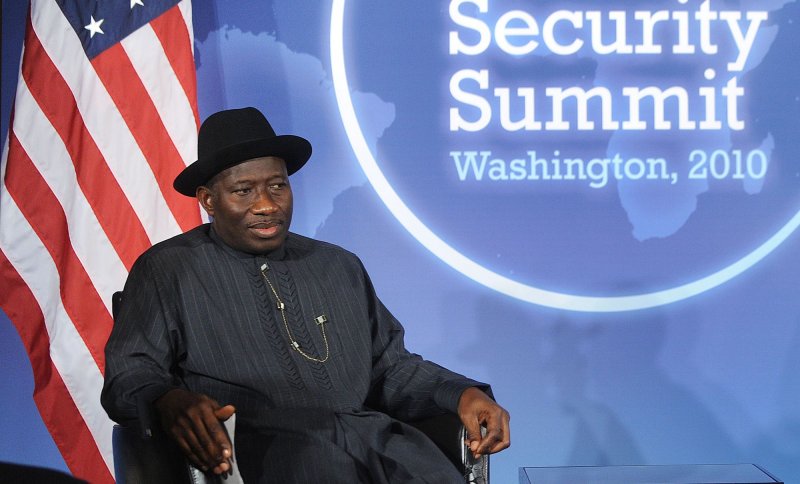Acting President Goodluck Johnson of Nigeria looks on during a meeting with President Obama at the Blair House April 11, 2010 in Washington, DC. UPI/Olivier Douliery/Pool |
License Photo
PORT HARCOURT, Nigeria, Sept. 29 (UPI) -- Insurgents in Nigeria's southern oil fields are reported to be rearming amid a faltering peace agreement with the government as Africa's most populous country prepares for a January presidential election that could split the nation.
Africa Energy Intelligence, a Paris Web site, quoted several leaders of the Movement for the Emancipation of the Niger Delta, the main insurgent force, as saying they have acquired new weapons in recent months.
It gave no details but observed that "an upsurge of violence in the run-up to the president election seems increasingly likely."
In the summer of 2009, Mend agreed to a cease-fire after President Umaru Yar'Adua declared an amnesty to save the oil industry. That halted four years of attacks on oil installations and a wave of lawlessness in the region, one of the country's poorest despite its oil wealth.
Some 20,000 militants surrendered their weapons in return for Yar'Adua promise to share oil revenues more equitably and to provide jobs and training for militants who surrendered.
But Yar'Adua was stricken with heart problems and died in May. The cease-fire started to fall apart. Young militants complained they weren't getting any government assistance.
The government reportedly handed over around $120 million to militant leaders but little of that apparently filtered down to the young fighters who sought to resume their campaign against the oil industry.
Yar'Adua's successor, his vice president, Goodluck Jonathan, sought to salvage the cease-fire but with elections scheduled local politicians started recruiting gunmen for their private militias, which are used to intimidate voters during campaigning.
Nigeria is currently gripped by upheaval as political barons in the mainly Muslim north grapple with their rivals in the overwhelmingly Christian south.
Under a political pact, the two regions are to alternate occupying the presidency for two four-year terms. Yar'Adua, a northerner, died three years into his first term and the northerners claim they should retain the presidency until 2015.
Jonathan, a southern reformist, has announced he will run in the January poll, opening the way for a potentially explosive political battle into which the southern oil fields will inevitably be drawn.
The nation cannot afford to have that happen. The depredations of Mend and smaller insurgent groups demanding a better life for the tribes of the Niger Delta slashed oil production from 2.6 million barrels per day in 2006 to around 1 million bpd.
The insurgents, based in the mangrove swamps and palm-line creeks of the Niger Delta, have carried out a few attacks in recent months. But haven't launched a full-blown campaign against the oil industry.
In the past, that consisted of bombing oil installations and pipelines and kidnapping foreign employees of the oil majors operating in Nigeria, such as Chevron of the United States, Total of France and Royal Dutch Shell for six-figure ransoms.
If they do go on the warpath again, they could carry their bush war to Nigeria's cities as well. Jonathan cannot afford to let that happen.
Central Nigeria is wracked by eye-for-an-eye massacres by warring Islamist and Christian militants in which thousands of people have been killed. A north-south political battle could exacerbate the bloodletting.
If Jonathan, 52, isn't able to make a deal with his fellow southerners or improve their living conditions and, their microscopic share of oil revenues, and stamp out endemic corruption, he faces major turmoil.
He's already deeply unpopular with the ruling elite. The scale of the corruption problem was showcased in an official investigation that concluded in May the elite had stolen more than $300 billion since independence from Britain in 1960.
Corruption is the root cause of much of Nigeria's civil disorder among its 150 million population.
And since the state's main revenues come from oil, Jonathan is going to have to fight the election largely on energy issues and salvage a floundering oil industry.
And he is no doubt acutely aware that internal conflict is a possibility as regional and sectarian differences worsen.
Disputes stemming from elections five years after independence triggered sectarian clashes that led to a military coup in 1966, and a civil war in which more than 1 million people perished as the oil-rich southeast sought to secede as the Republic of Biafra.
The secessionists were crushed in 1970 but military dictatorships continued until 1999.















